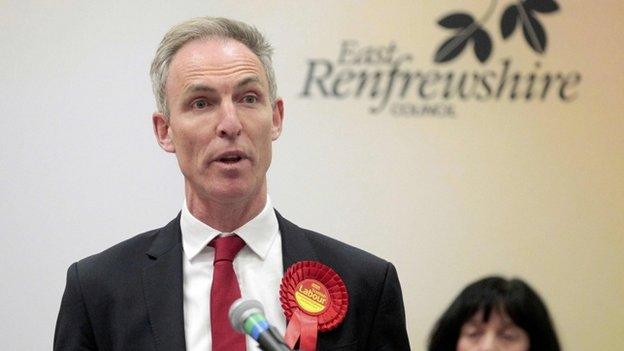Scottish Labour leader Jim Murphy to resign
- Published
- comments
Jim Murphy says he will stand down as leader in June
Scottish Labour leader Jim Murphy is to resign next month, he has announced.
It comes despite Mr Murphy narrowly surviving a vote of no confidence at a meeting of the party's national executive in Glasgow.
Mr Murphy said he would tender his resignation alongside a plan to reform the party.
He lost his seat in last week's general election as the SNP won 56 of the 59 Scottish seats, leaving Labour with a single MP in Scotland.
Mr Murphy said he wanted to have a successor as leader in place by the summer, and confirmed he would not be standing for a seat at the Scottish Parliament in next year's election.
Instead, he said it was time to "do something else" and that he believed the party would continue to be divided if he remained as leader.
His deputy, Kezia Dugdale MSP, will become acting leader until a permanent successor is found.
'Divide the party'
Mr Murphy had faced calls to resign from several MSPs, trade unions and former MPs in the wake of his party's near wipeout at the general election.
He insisted he had decided to stand down ahead of the national executive voting by 17-14 in favour of him staying in the job.
Speaking at a media conference after the national executive meeting, he said: "It is clear that a small minority who didn't accept my election as leader of the Scottish Labour Party just five months ago won't accept the vote of the executive today and that will continue to divide the party.
"Today I received more support in the executive vote than I did from members of the executive when I stood for election five months ago."
He said it would be up to the executive whether to accept the reforms he would be proposing before he left the post.
But he warned: "A party in such urgent need of reform blocks those changes at its peril."
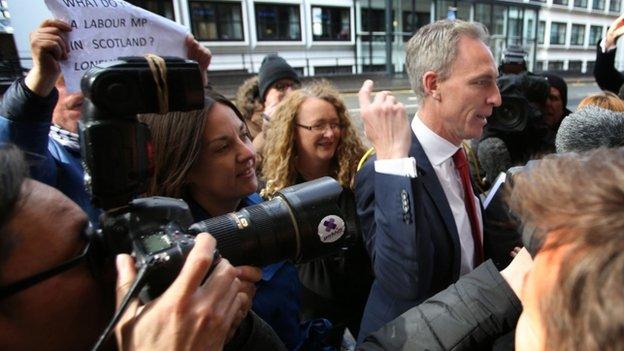
Mr Murphy was met by protestors as he arrived for the Scottish Labour national executive meeting in Glasgow
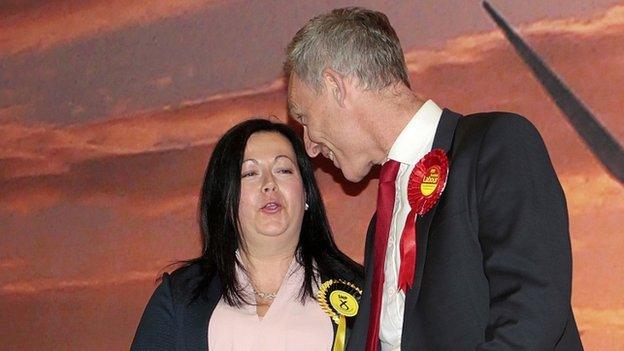
Mr Murphy lost his East Renfrewshire seat to the SNP's Kirsten Oswald in the general election
The former East Renfrewshire MP said Labour had been crushed between "two nationalisms" in Scotland and England.
Mr Murphy said he left no legacy of bitterness for anyone in the Labour Party, and the only person he was angry at was the person who blamed Scottish Labour for the party's UK-wide general election defeat - a reference to Unite leader Len McCluskey.
And he said that in many ways Scottish Labour was the "least modernised part of the Labour movement" and that he wanted his successor to be elected under a one member, one vote system.
Mr Murphy added: "The Labour Party's problem is not the link with trade unions, or even the relationship with Unite members - far from it. It is the destructive behaviour of one high profile trade unionist.
"The leader of the Scottish Labour Party doesn't serve at the grace of Len McCluskey, and the next leader of the UK Labour Party should not be picked by Len McCluskey."
Mr McCluskey has been a vocal critic of Mr Murphy's leadership and opposed his appointment in December when Mr Murphy won the contest to replace Johann Lamont.

Analysis by Andrew Kerr, BBC Scotland political correspondent
Jim Murphy laughed and joked with Scottish Labour's sole MP as he made his way down the hotel corridor to announce his resignation.
He certainly brought energy and dynamism to his election campaign - but all that achieved was Ian Murray in Edinburgh South.
So as Mr Murphy bows out, who could replace him?
The deputy leader Kezia Dugdale may want to step up or Neil Findlay could try again after challenging last time. Maybe the party's finance spokeswoman Jackie Baillie thinks her steady hand could steer the ship.
Jenny Marra is also often talked about as future face of the party.
Whoever steps into Jim Murphy's red shoes he or she will have to face a difficult 2016 Holyrood election, to put it mildly.
There are also more fundamental questions about how the party can possibly move on as it faces a surging SNP.
Mr Murphy was very much a creature of "New Labour" - but to today's generation that's old Labour.
Party members may start looking for someone with no links to the past, neither a Brownite nor a Blairite. A 'cleanskin' - as the politicos put it - may well help re-connect with voters.
That's a long way from now though - even some of the party's opponents may view this latest train wreck with a modicum of sympathy.

Ms Lamont had resigned after claiming Scottish Labour was treated like a "branch office" by the London-based party leadership.
Mr Murphy concluded his speech by saying: "Scotland needs a strong Labour party; Scotland needs a united Labour party. We have been the greatest force for change in our nation's remarkable history.
"The Scottish Labour party will rise again. It will be under someone else's leadership and I am confident about my party's future."
Harriet Harman MP, acting leader of the UK Labour Party, said it would be for Scottish Labour to choose a new leader.
She added: "As a cabinet minister and leader of his party in Scotland, Jim has been a hugely important figure in the Labour Party. He leaves with the best wishes and thanks of our movement."
Labour peer Lord McConnell, a former Scottish first minister, said the party's problems were "much deeper than one individual and one affiliate".
'Fresh approach'
He said: "We have a disconnect locally and nationally with wider Scottish society.
"We have a problem with our political positioning in the post devolution age where the party particularly at the UK level has never been comfortable with success in the Scottish parliament and has always tried to see things through a UK prism rather than a Scottish prism.
"We need to find a new generation, a new leader, new generation, new ideas, a fresh approach."
In a tweet, Scottish first minister and SNP leader Nicola Sturgeon said: "I wish Jim Murphy all the very best for the future. Leadership is not easy and he deserves credit for standing up for what he believes in."
Scottish Conservative leader Ruth Davidson also reacted on Twitter, saying: "Jim Murphy announces a managed exit in order to help the party, which is to his credit. But leaves a tough gig for whoever comes next."
The meeting of Scottish Labour's executive was disrupted by protesters who entered the party's headquarters.
Police were called and the protesters, who included persistent anti-austerity activists Sean Clerkin and Piers Doughty-Brown, left the building to protest further from the street outside.
The protesters were calling for Mr Murphy to remain as leader to "finish the job of destroying Scottish Labour".
A Police Scotland spokeswoman said officers had been called and found two protestors on the third floor of the building.
She added: "Both left on police arrival. Advice and assistance was given."
- Published16 May 2015
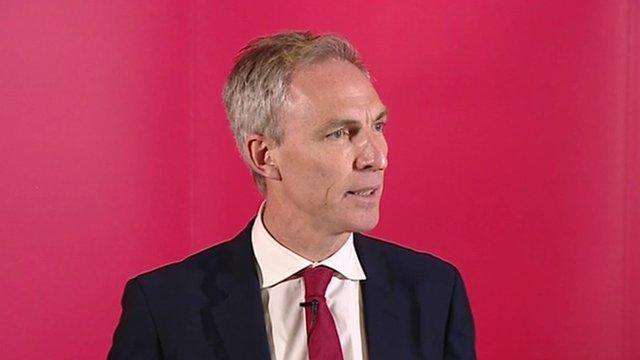
- Published16 May 2015
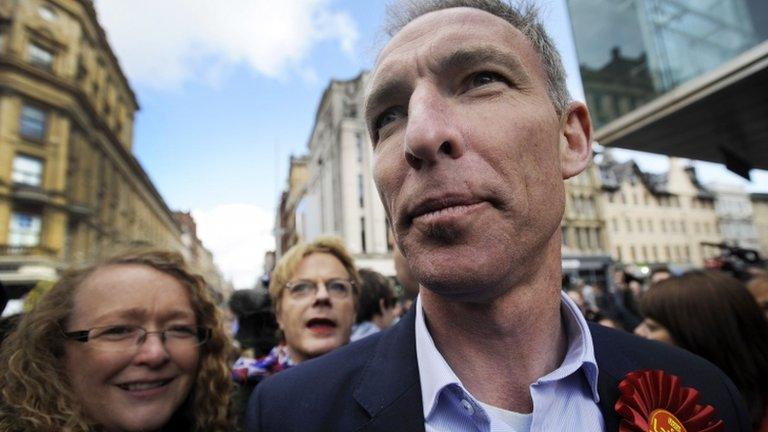
- Published14 May 2015
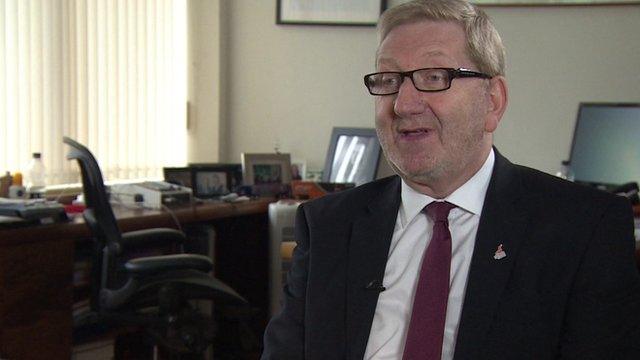
- Published13 May 2015
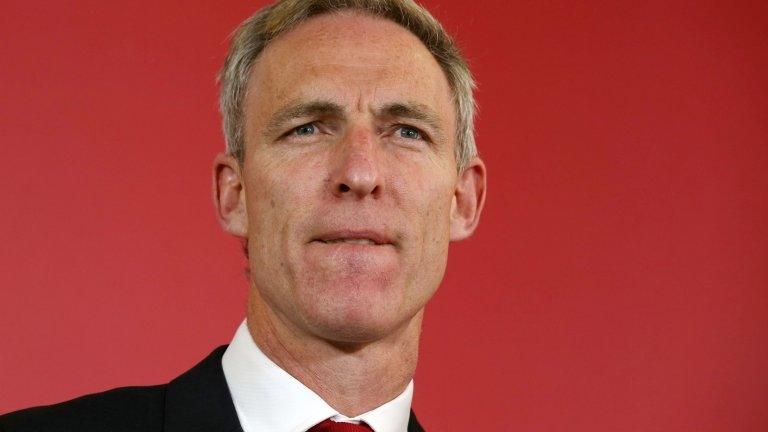
- Published12 May 2015
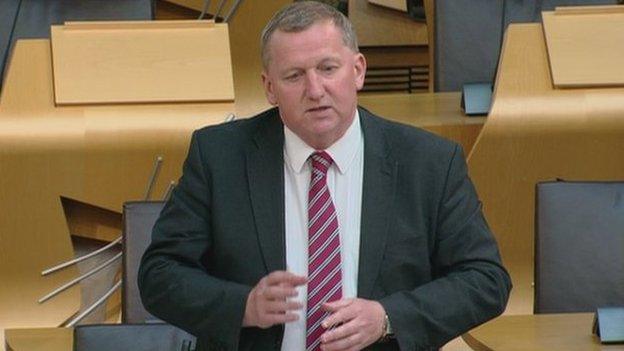
- Published9 May 2015
